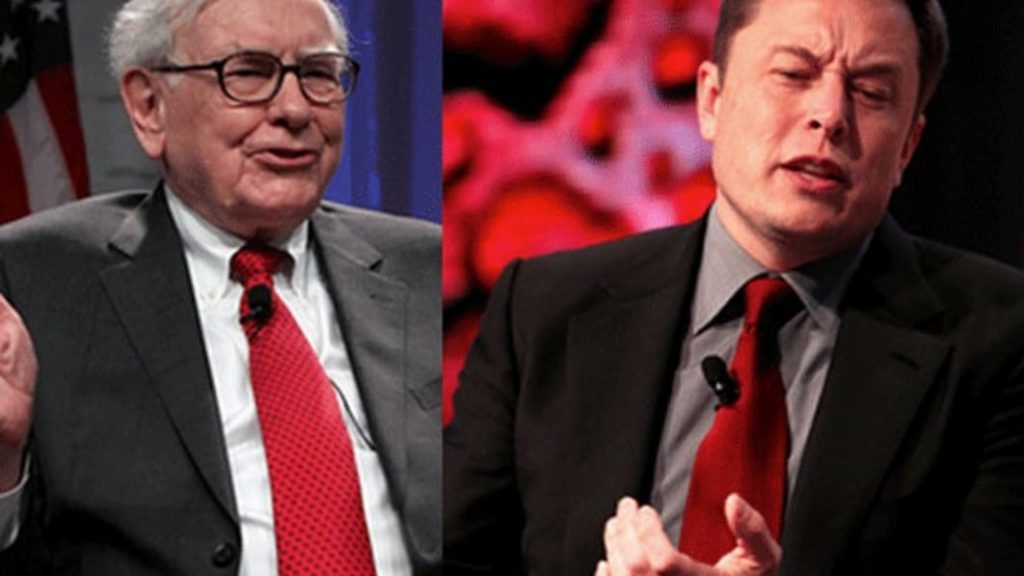Tesla market value drops $600 billion, worth less than Warren Buffett's Berkshire Hathaway

Warren Buffett (left) and
Elon Musk (right).
Alex Wong/Getty, REUTERS/Rebecca Cook
Elon Musk’s Tesla has dropped below Warren Buffett’s Berkshire Hathaway in market value.
Tesla stock has been hit by a wider tech sell-off and concerns over Musk’s Twitter takeover.
Berkshire has benefited from the rush to haven assets, and profited from higher interest rates.
Elon Musk’s Tesla has tumbled below Warren Buffett’s Berkshire Hathaway in market value, as investors continue to swap out riskier stocks for safer options, and worry Musk’s Twitter takeover could be a costly distraction.
Tesla’s market capitalization fell to just over $600 billion as of Tuesday’s close, well short of Berkshire’s $645 billion market value. Buffett’s company has officially reclaimed its spot as the fifth-largest company in the S&P 500 index.
That’s a striking reversal, given shares of Musk’s electric-vehicle maker soared from a split-adjusted $30 at the start of 2020 to north of $400 last November, lifting the company’s market cap from under $100 billion to over $1.2 trillion at its peak.
According to latest figures, Tesla stock has plunged by 52% this year, wiping roughly $600 billion from the automaker’s market cap. Meanwhile, Berkshire shares have slid just 3%, leaving the conglomerate’s market cap virtually intact. The contrast in their fortunes reflects how differently investors perceive the risk of holding each of their stocks.
Musk’s company has been hammered by a wider exodus from technology stocks in the face of stubborn inflation, rising interest rates, and a looming recession.
Fast-growing businesses promise to earn the bulk of their profits in the future, but those dollars become less appealing when prices are rising, and savings accounts and bonds are offering larger, guaranteed returns.
Moreover, tech companies’ lofty valuations, lack of steady cash flows, and more speculative investments often make them more vulnerable to economic downturns.
Also, Musk recently closed his $44 billion buyout of Twitter, and is now in the process of revamping the social-media platform, laying off roughly half its workforce, and trying to stop it from hemorrhaging cash. He just sold about $4 billion of Tesla stock, likely to service the loans he took out to finance his takeover.
Close followers of Tesla fear Musk has become less focused on the automaker, and might sell more shares, which could temper the company’s prospects and drag down its stock price.
Berkshire stock has fared better this year as investors consider it a safe place to keep their money. Buffett’s company actually benefited from higher interest rates and a stronger dollar last quarter, reflecting its mountain of cash and bonds, and its largely domestic focus.
Buffett is also known for prizing stocks and businesses with strong brands that dominate their markets, such as Kraft Heinz and Coca-Cola, as they’re able to raise prices to offset inflation. Moreover, Berkshire is hugely diversified, so a housing-market crash or a plunge in retail sales is unlikely to eviscerate its earnings.
Notably, Berkshire has poured upwards of $25 billion into Chevron and Occidental Petroleum this year, and now counts the two oil-and-gas companies among the top holdings in its stock portfolio.
Those bets have soared in value this year, as Russia’s war with Ukraine continues to roil energy markets and drive up prices, which has helped to offset weakness in other parts of Berkshire’s business.
Tesla could find another gear and zoom past Berkshire in market value, but for now at least, Buffett has the bragging rights over Musk once again.
Read the original article on Business Insider



